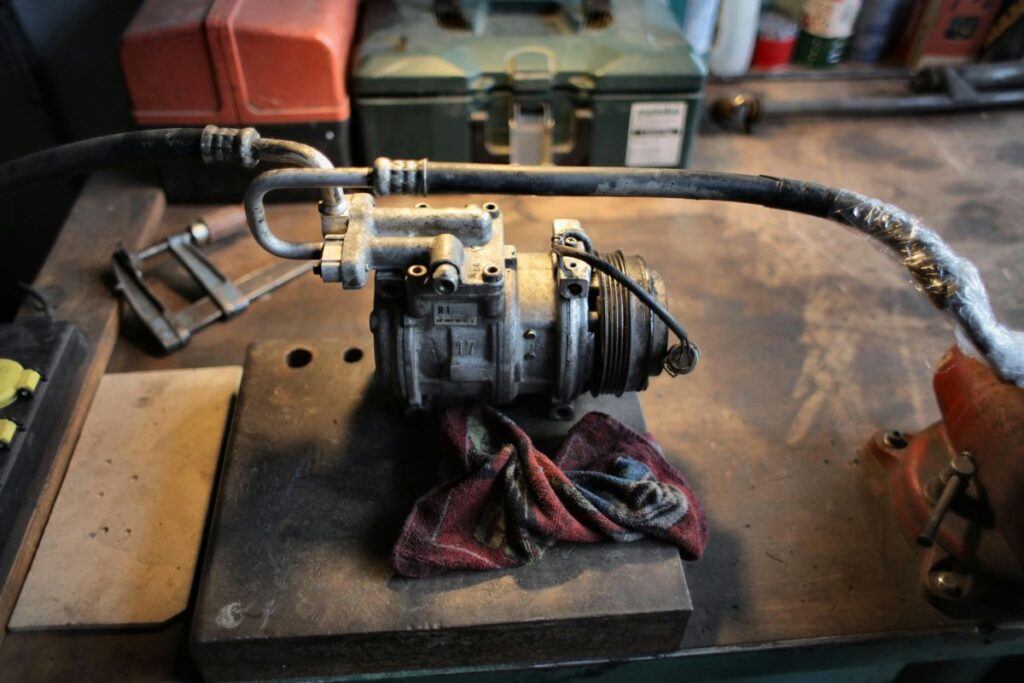Blog
What Causes an Air Conditioner Compressor to Stop Working?

The AC compressor is a vital component in the HVAC system, responsible for circulating refrigerant and facilitating the heat exchange necessary for cooling your home. When the AC compressor fails, it can leave you sweltering in the heat and lead to costly repairs. Understanding why your AC compressor stops working can help you proactively prevent these issues and maintain a comfortable indoor environment.
As top-rated HVAC contractors in Colorado, we’ve decided to help you understand the most common reasons behind AC compressor failure. Whether the failure is due to electrical problems, refrigerant issues, or mechanical failures, this guide will help you identify the root causes and take appropriate steps to keep your AC system running smoothly.
Why Your AC Compressor Isn’t Working: The Short Answer
An AC compressor can stop working due to electrical issues, refrigerant problems, or mechanical failures. Proper maintenance, timely inspections, and professional repairs are essential to prevent these issues and ensure the longevity of your HVAC system.
Electrical Issues
Common Electrical Problems
Electrical issues are a frequent cause of AC compressor failure. Problems such as damaged contactors, wires, and fuses can disrupt the power supply to the compressor. Power surges, often caused by lightning strikes or electrical grid issues, can also lead to acid buildup inside the compressor, resulting in overheating and burnout.
Diagnosis and Solutions
To address electrical issues:
- Reset the Circuit Breaker: If the circuit breaker trips, reset it and see if the compressor resumes operation. If the breaker continues to trip, it indicates a more severe electrical problem that requires professional inspection.
- Inspect Electrical Components: Look for signs of damage, such as burned wires or pitted contacts in the contactor. Be aware that conducting these inspections yourself can be dangerous if you don’t take proper safety precautions. A professional HVAC technician can diagnose and replace faulty components to restore proper function.
Refrigerant Problems
Low Refrigerant Levels
Refrigerant leaks, often caused by corrosion or cracks in the coils, result in insufficient refrigerant circulating through the system. This forces the compressor to work harder to maintain the desired temperature, leading to overheating and eventual failure. It’s a common misconception that refrigerant naturally depletes over time; however, low refrigerant levels typically indicate a leak that needs urgent attention.
Diagnosis and Solutions
To address low refrigerant levels:
- Identify Leaks: Look for visible signs of refrigerant leaks, such as frost buildup on the evaporator coils or hissing noises. However, identifying leaks often requires professional tools and expertise.
- Professional Recharging: Since handling refrigerant involves specific regulations and safety protocols, it’s essential to have a licensed HVAC technician recharge the system and seal any leaks.
Excess Refrigerant
On the flip side, too much refrigerant can also cause problems. Excess refrigerant in the system can lead to subcooling and increased pressure, stressing the compressor and other components. This issue often arises from improper servicing, where an inexperienced technician overcharges the system.
Diagnosis and Solutions
To manage excess refrigerant:
- Professional Assistance: It’s crucial to have an experienced HVAC technician handle refrigerant levels. They can use a reclaimer to remove the excess refrigerant safely and ensure the system is charged according to the manufacturer’s specifications.
- Regular Maintenance: Scheduling regular maintenance checks can prevent improper refrigerant levels and ensure the system operates within the recommended parameters.
Mechanical Failures
Overheating and Lubrication Issues
Various factors, including direct sunlight exposure, inadequate ventilation, dirty coils, and low refrigerant levels, can contribute to overheating. Additionally, proper lubrication is essential for the compressor’s mechanical parts to function smoothly.
Diagnosis and Solutions
To prevent overheating and lubrication issues:
- Ensure Adequate Ventilation: Ensure the outdoor unit has sufficient ventilation and is not exposed to direct sunlight. Installing a shade or relocating the unit can help reduce overheating.
- Regular Cleaning: Clean the condenser coils and air filters to maintain efficient heat exchange and airflow. This prevents the system from overworking and overheating.
- Check Lubricant Levels: Regular maintenance should include checking and replenishing the lubrication levels. An HVAC technician can inspect for leaks and ensure all parts are adequately lubricated.
Suction Line Blockages
The suction line carries the gaseous refrigerant to the compressor. Any blockage in this line can restrict refrigerant flow, forcing the compressor to work harder and eventually causing damage.
Diagnosis and Solutions
To address suction line blockages:
- Inspect for Blockages: Look for signs such as reduced cooling capacity or unusual noises. If you suspect a blockage, turn off the AC and inspect the suction line.
- Vacuum the Line: Use a vacuum to remove any debris blocking the suction line. This is a simple fix for minor blockages, but persistent issues may require professional intervention.
- Regular Maintenance: Regularly check and replace air filters to prevent debris from entering the suction line. Ensure the entire system is clean and free of obstructions.
Condenser Fan Problems
The condenser fan is essential for expelling hot air from the system. If the fan stops working, the compressor can overheat and fail. Common causes of condenser fan problems include motor failure, capacitor issues, or electrical faults.
Diagnosis and Solutions
To diagnose and fix condenser fan problems:
- Check the Fan Operation: Ensure the condenser fan runs when the AC is on. If the fan is not working or running slowly, it may need repair or replacement.
- Inspect the Capacitor and Motor: A bad capacitor or motor can prevent the fan from operating correctly. Replacing these components often resolves the issue.
- Professional Repair: If the fan is damaged beyond repair, an experienced HVAC technician should replace it. They can also diagnose any underlying issues causing the fan failure.
When to Replace Your Compressor
Evaluating Repair vs. Replacement
- Age of the Unit: If your AC unit is more than 10-15 years old, it might be more cost-effective to replace the entire system rather than just the compressor. Older units are less efficient and more prone to frequent breakdowns, which can lead to higher repair costs over time.
- Cost of Repairs: Compare repairing the compressor to replacing the unit. If the repair costs are more than half the price of a new unit, replacement is often the better option. Additionally, newer units are more energy-efficient, saving you money on utility bills in the long run.
- Warranty Considerations: Check if your compressor or AC unit is still under warranty. Some manufacturers offer extensive warranties that cover compressor replacement, which can significantly reduce your out-of-pocket expenses. If it turns out that the entire unit needs replacement, there may even be scenarios where your homeowner’s insurance will cover the costs.
Professional Recommendations
When deciding between repair and replacement, it’s a good idea to get in touch with an HVAC professional. A technician can assess the condition of your existing unit, estimate repair costs, and provide recommendations based on your specific needs and budget. They can also help you choose a new unit that fits into your budget.
Final Thoughts on AC Compressor Breakdowns
Taking proactive measures to maintain your AC system can save you money, enhance comfort, and reduce the likelihood of unexpected breakdowns. Schedule annual maintenance visits with a licensed HVAC technician and perform routine checks to keep your system in top condition. By understanding the common causes of compressor failure and knowing when to seek professional help, you can ensure reliable and efficient performance from your HVAC system for years to come.
